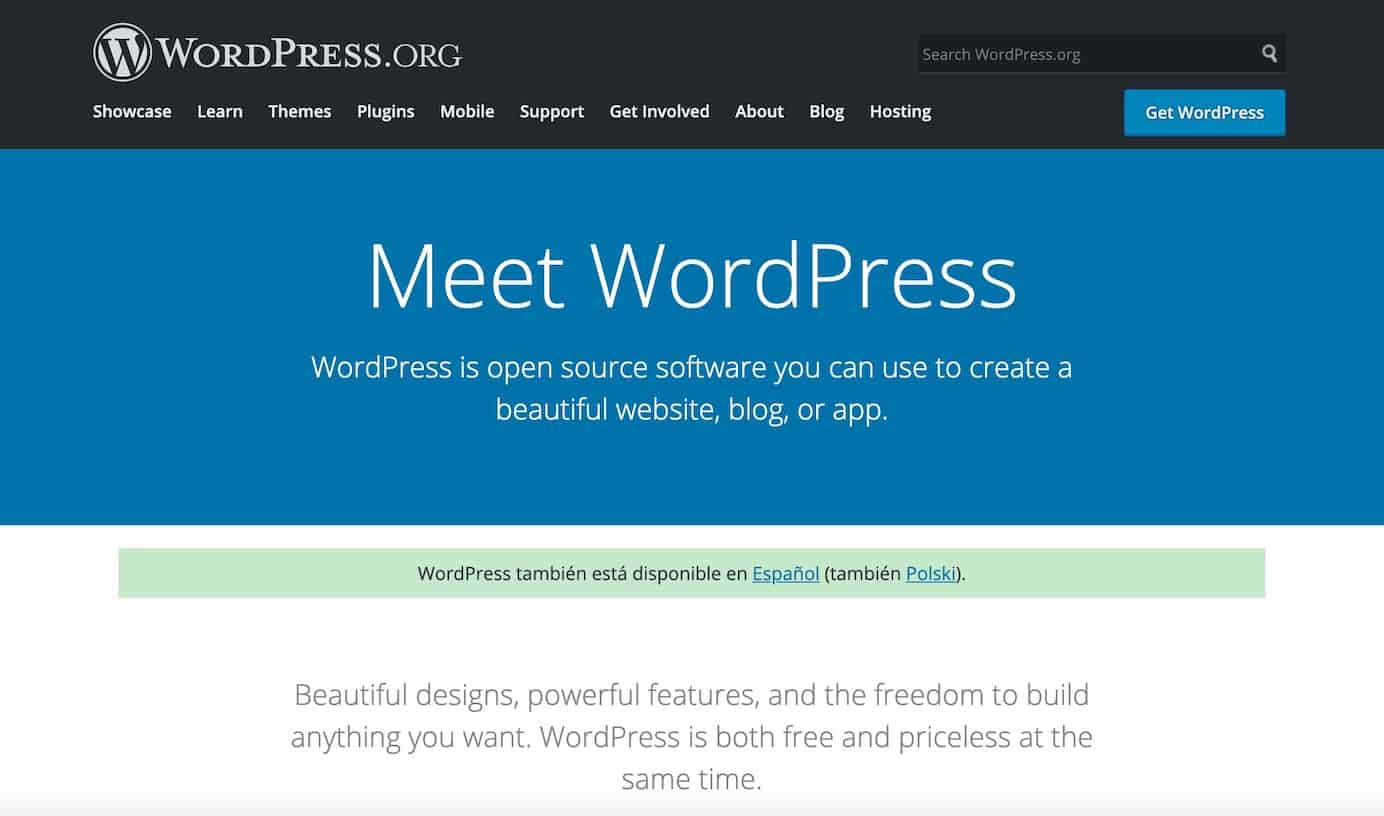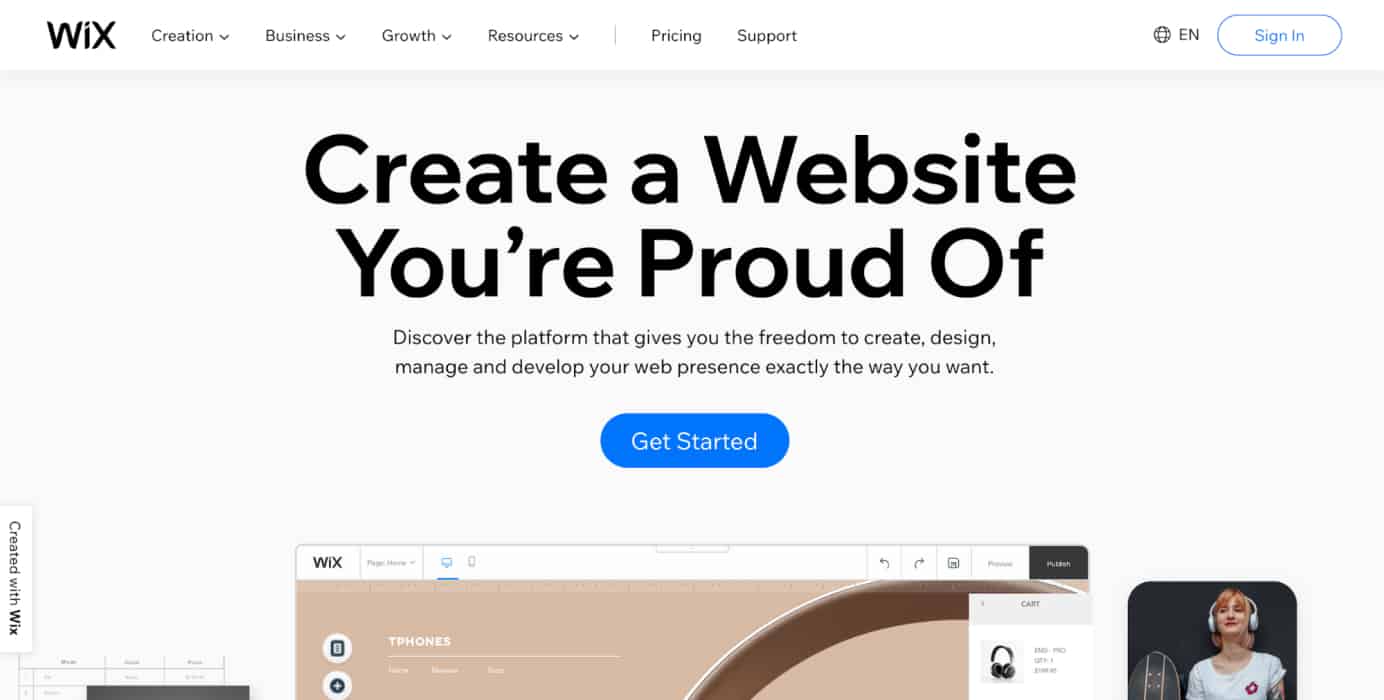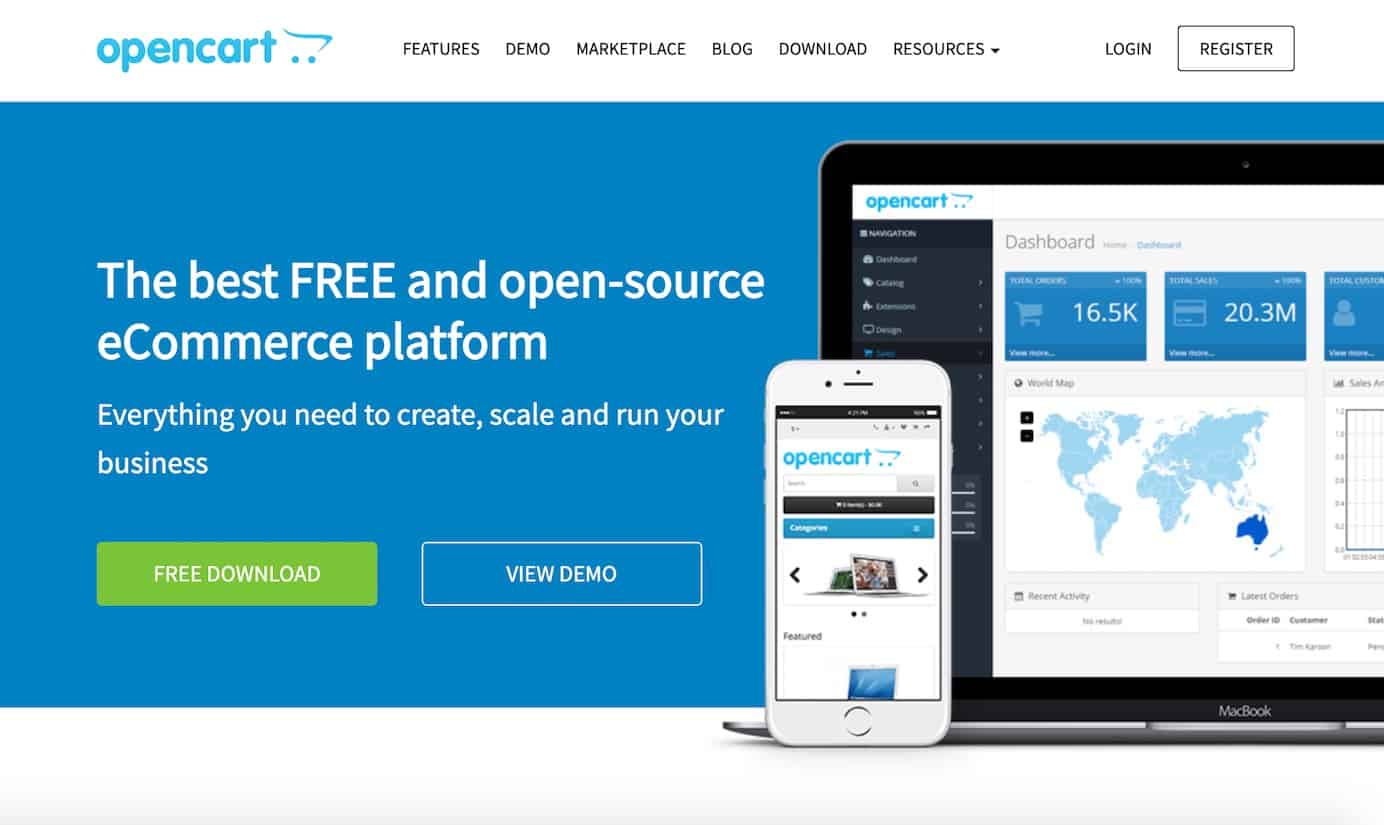Does your online store need a redesign? Planning to launch a new small business or a side business and need a WordPress website for it? Or perhaps, you have another type of website project in mind, but a limited budget?
Well, if you’re lost wondering, “How much does a website cost in 2024?” we’ve pulled together a detailed answer to your question.
Let’s dig in.
Table of Contents
- Blogging Costs
- Small Business Website Costs
- eCommerce Website Costs
- Enterprise Website Costs
- Typical Website Costs in 2024
- Website Costs FAQs
Blogging Costs: How Much Does it Cost to Start a Blog in 2024?
A blog is one of the easiest types of websites to develop. With a variety of free, paid, and open-source website builders, starting a blog in 2024 is oftentimes a point-and-click job. This fact reflects in the cost.
Blogs are often on the lower end of website development costs. You can develop a blog for as little as $80 to $5,000 depending on a variety of factors as outlined below.
Build It Yourself

If you have some knack for coding, you can start a blog on WordPress — a hugely open-source web development framework. According to the latest WordPress statistics, over 39% of all websites on the web are running on WordPress.
How come WordPress became so popular? Here are some reasons:
- It’s easy to use (and learn)
- The platform is free (WordPress.org) or freemium (WordPress.com)
- Active development community
- Loads of free and paid plugins and WordPress themes.
Now let’s have a look at how much does it cost to start a WordPress blog.
Cost Breakdown:
Upfront:
- Domain Name: $10 per year
- Website Software: $0 (using WordPress.org)
- Hosting: $6 per month, or $70 per year
- Design: $0-$60 one time (depending on if you choose a free or premium theme)
- Add-ons: $0-$100 one time (premium plugins may require paid upgrades/subscriptions)
Total: $80-$240 (or more) one time.
Website Maintenance:
- Domain name: $10 per year
- Hosting $70 per year
- Extra features: $0-100
Total: $80-$180 (or more) per year.
The cost depends greatly on how much customization you want. You can easily spend thousands on building and maintaining a corporate blog. But for a simple, personal blog $100-$200 yearly with slightly higher upfront costs is a reasonable ballpark.
Pros:
- Cheap
- Lots of control over the process
- Easy to learn
Cons:
- Larger time investment
- Limited customization, unless you have coding skills
Use Website Builders to Create a Blog

SaaS website builders such as Wix, Squarespace, or GoDaddy provide a domain name, hosting plan, website templates, native features, and security for a monthly subscription fee. On top of that, you can access certain add-ons for an extra fee — e.g. a paid theme or access to a payment processing tool.
Also, if your traffic grows and/or you want to add more web pages to your blog, you’d be forced to switch to a more expensive monthly plan.
Cost Breakdown:
- Website Builder: averages $12/mo for a basic plan
- Yearly Price: approximately $150
- App integrations: $15-$50/mo
Total: $150 to $450 per year.
Pros:
- Drag-and-drop, intuitive website development
- Standardized price (easy to budget for)
- Tech support and troubleshooting included in the plan
- Fast time-to-market for launching a blog
Cons:
- Limited customization: not all platforms provide access to source code
- Limited integrations: some website builders cannot be extended via plugins or third-party apps.
For a personal blog or a small website, a website builder is a good starter-option. You get access to easy-to-learn website development tools with the blog’s backend managed for you.
Hire a Freelancer to Build a Blog

Compared to the previous two steps, hiring a freelance developer to build a blog will cost more and the development process will take longer. The tradeoff of hiring a professional is not needing to learn the facets of web development. Instead, you pay for getting everything set up, configured, and secured for you. However, you’d still need to collaborate with the freelancer on the design and functionality specs.
Freelance web developers charge either a fixed project fee or — less frequently — by the hour.
The fixed price quote will include web development and design costs (if specified), based on the specs you’ve provided.
Cost Breakdown:
On average, expect to pay around $500-$5,000 for blog development. Why such a huge range? Well, the cost to build a blog varies a lot with your technology selection, requested list of features, design specs, customization, and the freelancer’s level of expertise.
Pros:
- You don’t need to personally commit to coding/designing
- Receive more custom features and extensions
- Security, performance, and speed optimization are done-for-you
Cons:
- Finding a reliable freelancer at a suitable price point takes time
- If you lack coding skills, maintaining a blog without help may be harder
Hire an Agency to Develop Your Blog

Hiring an agency is the most expensive, yet also the most hands-free way to build any type of website. For a personal blog, this may be a needless cost. But for business owners looking to add a blog to their corporate website (or redesign the current one), an agency can be a reasonable expense.
A web development agency can deliver a wider range of customization and branding opportunities than one freelancer could pull off. Apart from blog development, agencies also ‘up-sell’ a host of other services such as copywriting, logo design, SEO, testing/quality assurance. So that you are getting access to a bunch of services at once. Most agencies also provide ongoing website maintenance services for a fixed retainer.
Cost Breakdown:
However, all of this convenience comes at a cost. Hiring a web agency to develop your blog will cost between $3,000 and $10,000 upfront for a small-scale project, with around $500 yearly for maintenance.
Pros:
- All-inclusive package with the option for continued maintenance as well
- Professional consultations on design, security, hosting
- Endless options for customizations and integrations with other corporate software
Cons:
- The most expensive option for building a blog
- Agencies require evaluations too
Small Business Website Costs

Small business websites usually feature 10-15 landing pages, a blog, and perhaps some online booking, appointment scheduling, or eCommerce functionality.
That’s a standard set of assets for driving website traffic and building awareness around your products or services. Of course, your website might be more or less complex, depending on your niche and reliance on search as a channel for attracting customers.
If we base our estimates on the above, the upfront costs for a small business website will fall in the range of $80-$10,000. The precise rate will depend on how much customization you need, design- and feature-wise. To maintain your small business website, expect to pay $180-$1,000 yearly.
Build It Yourself
You can build a small business website on WordPress yourself. It’s reasonably easy. All you need to do is:
- Get a hosting plan
- Buy a domain name
- Download and install WordPress.org
- Choose and customize a website theme
- Add plugins for extra functionality
- Write and upload website content
- Hit publish!
Voilà, that’s the DIY way of building your small business website.
Cost breakdown:
Unlike a blog, a business website requires some extra features, and most of them are premium. Also, you’d want to invest a bit more in design and branding since you’d want your website to look polished and professional.
Upfront:
- Domain: $10
- Host: $70 per year
- Design: $0-$60
- Functionality: $0-$100+
Total: $80-$240 (or more).
Lastly, a business website requires regular maintenance since you don’t want to risk losing sensitive customer details to hackers (and paying huge fines!). So factor in the following costs too:
Annual Maintenance:
- Domain name renewal: $10
- Hosting: $70
- Anti-malware/security software: $100-$200
- Paid apps/plug-ins: $0-100
Total: $180-$250 (or more) per year.
Pros:
- Open-source software provides endless customization opportunities
- Development and maintenance knowledge available in-house (as you did it yourself)
- Lower annual costs for maintaining your website
Cons:
- Minimal external assistance if something goes wrong
- Performance optimization and website security are on you
- High time commitment
Use Website Builders to Create a Site for Your Business

Website builders provide out-of-the-box functionality for building a website without any coding. Most have graphic page builders that you use to design your website with pre-made elements and native features.
Cost Breakdown:
Monthly subscription plans for businesses range from $12 to $50, or $144-$600 per year.
Pros:
- Intuitive website building experience that does not require any technical knowledge
- Rapid page prototyping, design, and development, so that you launch faster
- Excellent collaboration opportunities — all people on your team can learn to use the builder.
Cons:
- Not every SaaS website builder lets you customize and extend their platform. You are forced with the tools/features you provide.
- Vendor lock-in — migrating from one platform to another can be technologically challenging and expensive.
Hire a Freelancer to Make a Small Business Site
Hiring a freelancer makes sense if you don’t have anyone in-house to deal with your website (and don’t want to invest your time into that either).
Cost Breakdown:
WordPress developers charge around $61-$80 per hour. A small business website will take roughly 50-100 hours to develop, so the total will round up to $3,000-$5,000. That’s without factoring in other costs such as a website theme/template or builder subscription, hosting plan, domain name, and premium plug-ins.
Pros:
- Get a professional, on-brand website with all the features you need
- No need to hire a new employee or re-train an existing one
Cons:
- Longer development timeline if you need advanced features or cannot provide good specs
- You may need to pay for a website theme or design separately unless you partner with a full-stack developer
- Schedule extra time for teaching your team how to use the new website
Hire an Agency to Develop Your Small Business Website
Hiring a web development agency is the easiest way to get a professional website. But outsourcing the entire process comes with the highest price tag.
Cost Breakdown:
A small website, developed by an agency, can cost anywhere from $5,000 to $25,000. Again, the final price quote boils down to your list of requested features, design customizations, and selected tech stack.
Pros:
- You get exactly the website you want with no compromises on features, branding, or design.
- Ongoing maintenance and optimization are often part of the deal.
Cons:
- The most expensive choice, especially if you require a ton of custom functionality.
- Presents the greatest continuing liability if you keep paying the same agency for troubleshooting, customization, and other maintenance tasks.
Ecommerce Website Costs

An eCommerce website is your gateway to selling online. You can use it either as an extension of your brick-and-mortar operations. Or as a standalone business venture.
In either case, you’ll need to choose a secure eCommerce platform that lets you create a delightful shopping experience for online visitors.
How much will you pay for an eCommerce website?
It depends on your scale and functionality. A simple Shopify store can cost as little as $300/year to build and run. But an enterprise-grade platform akin to Amazon nears, the annual operating costs can reach seven to eight figures per year.
In other words, the cost of developing a website increases exponentially with the website’s operation scale and complexity.
Build It Yourself
Building an eCommerce website yourself can be a time-consuming process. It is doable if you are a developer. But you might still get stuck with the design or integration aspects.
Cost Breakdown:
As for the costs, even if you use an open-source framework such as WooCommerce, plan to spend at least $300-$1,000 on your eCommerce website or more. The above costs factors in:
- Domain name
- More expensive hosting plan
- SSL certificate
- Premium theme
- Extensions/integrations with other commerce apps.
Of course, if you are a hobbyist you can do it cheaper than that.
Pros:
- An affordable option for coders who don’t mind pulling a few all-nighters
- A good way for starting a small eCommerce business or side project
Cons:
- You’d need to secure your website yourself and ensure that it’s compliant with local regulations
- The website’s functionality and design are limited by your coding skills
Use Website Builders to Create an Online Store

A website builder streamlines the eCommerce development process for small-to-mid market businesses. Monthly eCommerce subscription plans run between $18 to $300 per month, depending on how advanced the plan is in terms of features.
While you can start an online store fairly quickly with a website builder, you’ll often have less flexibility when it comes to custom functionality. Also, if you are running large-scale eCommerce operations, a SaaS eCommerce platform may not meet all your operational needs.
Pros:
- Monthly plans come at an attractive price point for smaller online stores
- Faster development timeline for a brand new store
- Intuitive, easy-to-use CMS and integrated operational tools
- Built-in security and payment processing
Cons:
- Not every eCommerce platform supports custom code and integrations
- Certain website builders have a limited capacity to support larger stores
Hire a Freelancer to Build Your Online Store

Using a freelancer is a middle-of-the-road way to set up a more complex eCommerce website. If you only need a relatively simple shop, you can buy a premium template and have a web designer or developer customize it for under $1,000.
Alternatively, if you want a more complex website with custom functionality and extensions, expect to pay $5,000-$10,000 for a smaller store, and up to $50,000-$80,000 for a more complex storefront on Magento or Salesforce Commerce cloud.
Maintenance costs can vary, but factor in $500-$1,000 per year.
Pros:
- Get a professional opinion on the best technology stack for your store
- Add extensions, integrations, and features you need, not get by default
- Create a unique shopping experience, closely aligned with your brand
Cons:
- Without a clear list of requirements, a freelance project can easily exceed the budget
- Support and maintenance will come at an extra cost
Hire an Agency to Develop Your Ecommerce Site
Partnering with an agency is more expensive, but a good eCommerce development partner will generate measurable ROI. Depending on the web store’s size and complexity, this agency could range anywhere from $10,000 to $250,000 for an enterprise eCommerce website.
On the other hand, agencies usually provide a full-spectrum of services — from conception and branding to development, roll-out, and maintenance. On top of that, you can commission a scalable website that grows organically with your business, instead of being confined by a host of features a website builder provides. That’s where the long-term ROI will come from.
Pros:
- Build a high-performing eCommerce platform that meets your current business needs and can be scaled to accommodate future growth
- Create a sleek user experience and delightful shopping experience with the help of professional consultants
- Choose any eCommerce platform or go for a fully custom build — there are no limits
Cons:
- Seek out an agile web development agency that can rapidly iterate on your feedback and requirements, unless you want an incredibly long development timeline
- In-house technical expertise will be required to oversee the development process
Enterprise Website Costs

Enterprise websites have a wide array of features and are tightly integrated with other business systems, powering the company’s digital operations. Ranging from multi-brand eCommerce stores to SaaS products, or large-scale publishing operations.
The costs are respective to the functionality required. An enterprise website can cost $100,000-$250,000 to develop. Additionally, annual maintenance costs, covering all cloud and on-premises infrastructure, are also often found in the tens of thousands.
Use Website Builders
Several SaaS builders recently launched enterprise offerings — plans with access to custom feature development, unlimited integrations, dedicated hosting, and other operational facets for running a large-scale website.
Enterprise pricing is largely quote-based, but expect to pay around $2,000-$5,000/mo. Also, factor in development and customization costs separately.
Pros:
- Save on backend development and hosting as that’s included in your plan
- Customize your front-end up to your liking via open APIs
- Maintenance, security, and compliance are handled for you
Cons:
- You still need a development partner to build and configure your website
- Limited control over the underlying infrastructure as it’s managed by the vendor
Hire a Freelancer
Hiring a freelancer to create an enterprise website from the ground up isn’t the best idea. But outsourcing some aspects of the development to contractors — UX design or new payment processor integration could make sense. However, expect to pay around $5,000-$10,000 for the provided services.
Alternatively, you can hire freelance developers to extend your in-house team.
Pros:
- Gain the technical expertise you don’t have in-house (or don’t want to keep on permanent payroll)
- Receive a second opinion on your website’s design, architecture, and performance to locate areas for improvement.
Cons:
- You cannot run an end-to-end enterprise website development project on the back of one or two freelancers.
Hire an Agency
A web development agency can either take care of the full development or provide a managed team that will work exclusively on your project. So that you don’t need to hire internally or re-assign people from other projects.
The price tag will vary, depending on the contract type and your needs. But expect to pay between $75,000-$250,000 for an enterprise-grade solution.
Pros:
- Contracting a managed team via an agency is less expensive than hiring an in-house team
- The rapid pace of development and delivery if the agency has a strong software development life cycle
Cons:
- Requires a mature operational process for contracting with external providers, as well as an in-house technical manager to oversee the development
Let’s Sum Up: Typical Website Costs in 2024
You need to factor in different types of website development costs to make an accurate estimate. Here are the most important costs to take into account.
Domain Name Costs ($10-$25/year on average)
You can register a domain name for as little as $10 for a year, or get one for free from your hosting provider or a website builder.
Mind that domain renewals can be more expensive than the original purchase, especially when obtained via a hosting company.
SSL Certificate Costs ($0-$300/year)
An SSL certificate provides an extra layer of security for processing sensitive customer data such as payment information. So it’s a must-have for eCommerce websites and any other types of businesses accepting payments or collecting customers’ data for creating accounts.
Some web hosts include a free SSL in your plan. If not, you’ll have to pay for an SSL certificate separately for $10-$300 per year.
Website Hosting Costs ($0-$1,500/mo)
If you are using a website builder, hosting is already included in your plan. For a self-hosted website (e.g. built on WordPress), you’ll have to research and buy a separate hosting plan. On average, you’ll pay around $100/year for a shared hosting plan.
Content Management System (CMS) Costs ($0-$25,000 on average)
A CMS provides graphical controls for managing your website. These come in-built with online website builders as well as SaaS eCommerce platforms.
Also, you can use one of the popular free content management systems:
- WordPress
- Joomla
- Drupal
For an enterprise website, you might want to build a custom CMS. Depending on your specs, this can cost between $10,000-$35,000 to develop.
Web Design Costs ($0-$15,000 on average)
Design costs will vary a lot depending on your needs. All website builders provide free-for-members templates that can be customized in a couple of clicks.
For a more unique look, you can purchase a premium theme for your website and then hire a designer to customize it.
Finally, you may want to hire a UX/UI designer to create a memorable, on-brand online experience. In this case, the design costs can be anywhere from $5,000-$25,000, depending on your brief.
Online Marketing Costs ($0-$10,000/mo on average)
Digital marketing is not strictly an upfront website cost, but it is an important one to consider as you do the maths.
In particular, you’ll want to invest in:
- Professional copywriting/content creation services ($500-$5,000 on average)
- Search engine optimization ($250-$2,500/mo on average)
- Paid advertising campaigns (you can start with a $5/day budget)
Great content and SEO are the foundation of content marketing. While a well-configured PPC campaign can help drive traffic to product pages where organic ranking in SERP is difficult.
Also, don’t forget about social media marketing. Being present on popular platforms allows you to interact with your customers more closely, plus improve your brand awareness.
If you don’t have someone doing this in-house, you can contract SMM services for $250 and $2,500 per month.